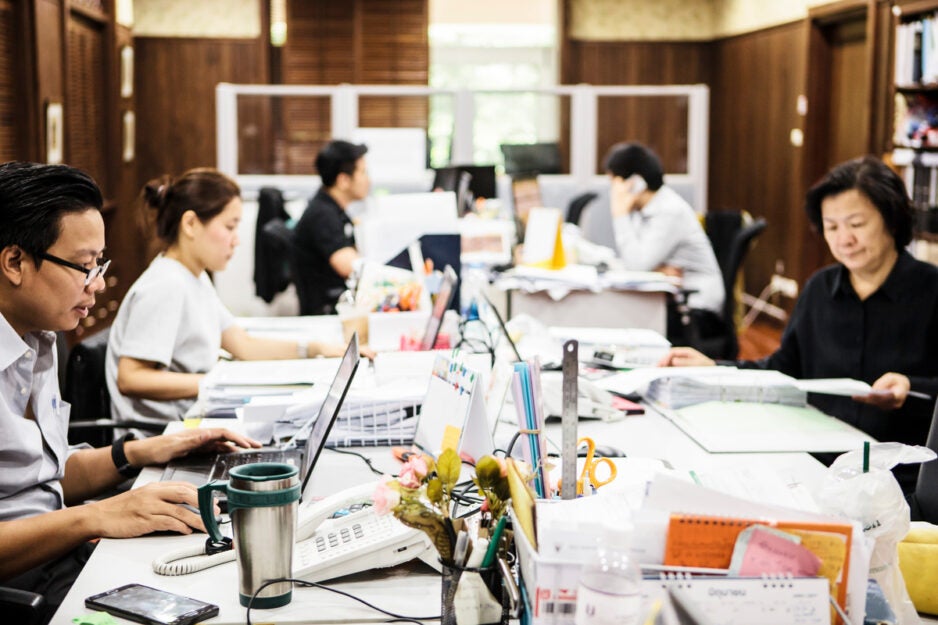Join SHINE researcher Nidhi Ghildayal on Thursday, April 11 at 12:00 PM EST to hear about her research that seeks to understand the connections between safety, community and flourishing in the workplace and how flourishing builds resilience that can be protective to health during times of challenge. Traumatic events will continue to occur in the form of global pandemics, climate events, and economic or political changes. Mental health worldwide is…
Presentation – The Business Case for Flourishing
If you missed our last SHINE Summit, you can now watch the keynote by the Human Flourishing Program’s Tyler VanderWeele on The Business Case for Flourishing. View presentation here.
New Paper – Associations of well-being with work distraction and job satisfaction
A new paper in Frontiers in Psychology, Prospective associations of multidimensional well-being with work distraction and job satisfaction: a two-wave study of US employees, by Eric N. Fung, Richard G. Cowden, Ying Chen, Dorota Weziak-Bialowolska, Piotr Bialowolski, Matthew T. Lee, Eileen McNeely and Tyler J. VanderWeele, examines prospective associations between six domains of well-being (emotional health, physical health, meaning & purpose, character strengths, social connectedness, and financial security) and two…
Continue reading “New Paper – Associations of well-being with work distraction and job satisfaction”
In the News – Harvard Gazette on role of our study in lawsuit victory
Following the introduction of new uniforms in 2016, American Airlines flight attendants began experiencing rashes, headaches, and breathing problems. One American Airlines flight attendant, Tracey Silver-Charan, told The Washington Post: “My eyes looked like I was in a boxing match. My eyes were swollen. I would get bronchitis and laryngitis, and I recorded it and sent it to the president and CEO of the company saying: ‘Please help us and…
Continue reading “In the News – Harvard Gazette on role of our study in lawsuit victory”
In the News – Washington Post on flight attendant health impacts from uniforms
A jury in California recently awarded more than $1 million in a verdict against Twin Hill, the maker of airline attendants’ uniforms used by American Airlines crew, due to serious negative health impacts associated with the clothing. Research from the Harvard Flight Attendant Health Study played a pivotal role in the legal victory. Eileen McNeely, principal investigator of the Flight Attendant Health Study, was interviewed by the Washington Post about…
Continue reading “In the News – Washington Post on flight attendant health impacts from uniforms”
New Paper – Indoor air quality and well-being among office workers
A new paper in Building and Environment examines indoor environmental quality (IEQ) and its effects on human well-being in office space. Objective indoor air quality parameters and their association to respiratory health and well-being among office workers, authored by Hooman Parhizkar, Pablo Taddei, Dorota Weziak-Bialowolska, Eileen McNeely, John D. Spengler and Jose Guillermo Cedeño Laurent set out to understand the associations between environmental and social factors of work and human…
Continue reading “New Paper – Indoor air quality and well-being among office workers”
Special Issue: People – the next sustainability frontier
SHINE is pleased to announce that the quarterly online journal Merits (ISSN: 2673-8104), which focuses on contemporary research issues related to enabling people at work to thrive, will publish a special issue on “People—the Next Sustainability Frontier,” Guest Edited by Merits Editor-in-Chief and SHINE Affiliated Research Scientist Prof Dr. Wendy Purcell. Researchers are invited to share their studies, insights, and considered views through Merits to illustrate how business and organizations…
Continue reading “Special Issue: People – the next sustainability frontier”
New Paper – Differences in well-being among factory workers in six countries
A new paper in Applied Research in Quality of Life examines cross-cultural comparisons of well-being among factory workers, as measured by the six well-being domains of happiness and life satisfaction, physical and mental health, meaning and purpose, character and virtue, close social relationships, and financial and material stability. Differences in Multi-Dimensional Well-being Among Factory Workers: Evidence from Six Countries, authored by Piotr Bialowolski, Matthew T. Lee, Dorota Weziak-Bialowolska, Ying Chen,…
Continue reading “New Paper – Differences in well-being among factory workers in six countries”
SHINE Joins Human Flourishing Program
We are pleased to share the news that SHINE has joined the Human Flourishing Program at the Institute for Quantitative Social Science at Harvard University to advance a systematic approach to human flourishing at the organizational level. “It is exciting to welcome the SHINE research team into the Human Flourishing Program,” says Tyler VanderWeele, Director of the Human Flourishing Program, “as the work that we’ve been able to do together…
New Podcast – What does flying do to my body?
SHINE Executive Director Eileen McNeely, Principal Investigator of the Harvard Flight Attendant Health Study, is interviewed by BBC News World Service’s Caroline Steel on the health impacts of air travel. Compared to the entirety of human existence, our history of flying in aeroplanes is very short indeed. So what does this fast form of travel do to bodies that have evolved for land-based living? That’s what listener Sofia wants to…
Continue reading “New Podcast – What does flying do to my body?”










